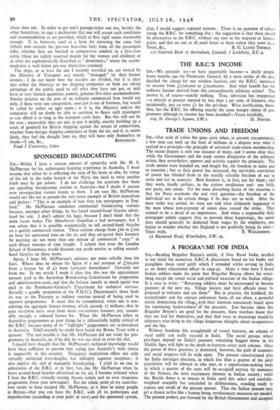SPONSORED BROADCASTING .
SIR,—Whilst I have a certain amount of sympathy with Mr. H. S. McPherson for his unfortunate listening experience in Australia, I must assume that either he is reflecting the taste of-his hosts or else, by virtue of his job in the radio branch of the Navy, too tired to twist another knob once he got ashore. I do not challenge his assertion that there are appalling broadcasting stations in Australia—but I doubt if anyone save unsuspecting visitors listens to them. I am sure Mr, McPherson would not like me to present the very worst example of British journalism and declare: "This is an example of how they run newspapers in Eng- land." Mr. McPherson condemns commercial broadcasting stations because, amongst other things, he has heard second-hand bicycles adver- tised for sale. I don't admire his logic, because I don't think that the same factor makes The Manchester Guardian a bad newspaper, but I can refute that it is possible economically to sell second-hand bicycles on a quality commercial-station. These stations charge from £6o to £m° an hour for sponsored time on the air, and they safeguard their listeners by insisting on not more than one minute of commercial " copy " in each fifteen minutes of time bought. I submit that even the London School of Economics would discount any profit motive in selling second- hand bicycles on those terms.
Again, I hope Mr. McPherson's opinions are more reliable than his facts. Where does he obtain his figure of a net. revenue of £7oo,000 from a licence fee of £1 from 7,000,000 Australians? Certainly not from me. In my article I made it clear that this was the approximate amount paid to the Australian Broadcasting Commission for programme and administrative costs, and that the balance (nearly as much again) was paid to the Postmaster-General's Department for technical services. Actually a goodly proportion of the P.M.G.'s, Department's share finds its way to the Treasury as indirect taxation instead of being, used to improve programmes. It must also be remembered, when one is con- sidering the aggregate licence revenue, which exceeds I.; millions, that in poor reception areas away from main transmitters listeners pay, reason- ably enough, a reduced licence fee. When Mr. McPherson refers to Australian programmes as poor things he is inferentially highly critical of the B.B.C. because many of its " highlight " programmes are re ,broadcast in Australia. Until recently he could have heard the Brains Trust with a sponsor. The real trouble is that Mr. McPherson did not study his pro- grammes in Australia, or, if he did, he was too tired to twist the dial.
I should have thought that Mr. McPherson's technical knowledge would have been sufficient to prevent him saying that Australia's wide choice is impossible in this *country. Frequency modulation offers not only virtually unlimited wave-lengths, but infinitely superior reception ; it also implies the end of monopoly broadcasting. I yield to no one in admiration of the B.B.C. at its best, but, like Mr. McPherson when he hears second-hand bicycles advertised on the air, I become irritated when I hear the B.B.C. virtually touting theatre tickets and its own .twopenny programme (from your newsagent). But the whole point of my contribu- tion seems to have escaped Mr. McPherson, as' it does so many people in Britain—that you can have the B.B.C. with all its perfections and imperfections (according to your point of view) and the sponsored system,
plus, I would suggest, regional systems. There is no question of substi- tuting the B.B.C. for something else ; the suggestion is that there should be alternatives to the B.B.C. without any cost to the taxpayer or licence- payer,
and that no one at all need listen to them unless they want to.— Yours, &c., R. G. LLOYD THOMAS. c/o National Bank of Australasia, Limited, 7 Lothbury, B.C. 2.






























 Previous page
Previous page